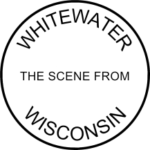Whitewater’s full-service grocery closed in 2015, and then the UW-Whitewater Foundation bought the property. (Premier Bank, successor to Commercial Bank, has a 5% interest in the property.) A developer from Minnesota, having been unsuccessful in a project near the center of town, now proposes purchasing the former grocery building & lot, and constructing a Fairfield Marriott on the property, while renovating the existing (now empty) grocery building (meeting space, office space, etc.).
Because the developer wants two buildings on the lot, he (through the existing owners) sought conditional use approval for his plan. Conditional use approval leaves many details left unaddressed, but it was a necessary first step.
A few remarks.
1. City of Whitewater obligations. If it should be true that Whitewater will incur no expenses for studies, water main relocations, or other costs – that these will be borne by the parties – then the project is of limited concern. There is no reason that the residents of this city should subsidize a hotel, but if they’ve not the burden of subsidizing one, then let the private parties do what they want.
If the UW-Foundation and Premier bank want to sell, with the expectation of a donation of a portion back later, let them. They are not unsophisticated parties – they should be free to buy and sell as they wish. If the deal goes bad, the risk would be (and should be) theirs alone.
2. Building on the lot. The parties want two buildings on the lot, but if they should want three or thirty, I’d not stop them. Practicality is a greater constraint than law. Many uses are permitted, but only some succeed.
3. Building height. There’s a funny moment when the city planner recognizes that the planned height of the hotel is 45′ not 145′. It’s true that a project of this size would not be 145′ high, but that’s not what’s funny. What’s funny is the idea that a 145′ building would be too tall for Whitewater.
Why? There are much worse things than a tall, privately-constructed building.
4. Economic benefits. This session was about whether the applicants would be granted conditional use approval. Along the way, the developer included a supposed list of economic gains. Much of it is simply unsupported, and looks suspiciously like grandiose claims meant to impress gullible or over-eager residents.
If these parties are spending their own money, and not burdening this city, then the economic benefits are their private matter. There is something risible, however, about reading the same boilerplate used elsewhere that’s meant to impress, but impresses only the ignorant or weak-minded.
It would have been faster for the parties to call residents of the city gullible than to waste time typing unsupported economic claims. (Much faster: gullible is only one word, while the developer’s memo, beginning at memo paragraph three in the packet below, uses 325 words for its economic claims.)
5. Gratitude. There’s an unfortunate moment midway in this discussion, when the council member on the Planning Commission tells the developer that “well, we’ve been hoping for a new hotel for a long time, so we’re grateful for, I would say, I’m grateful for the effort that you’re putting into this proposal…”
When one has told the developer that one is grateful for the effort, the developer understandably gets the signal that oversight will be minimal. Now, I’m not so concerned about oversight as long as this city’s residents aren’t paying for the project. Still, from a regulatory perspective – as required by law – expressions of gratitude are hardly a signal of scrutiny in the public interest.
6. Devil’s in the details. There’s another meeting of Planning Commission in October….
The 9.11.17 Plannning Commission packet, with agenda and relevant part (Item 9), appears below —

